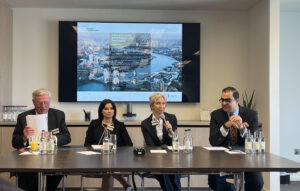On the third day of London International Disputes Week (LIDW) 2023, the panel on “Arbitration on the MENA Region: New Future” hosted by 39 Essex Chambers covered recent developments of arbitral institutions in the MENA region. The panel discussion took place among Vivek Kapoor, Richard Wilmot-Smith KC and Lindy Patterson KC from 39 Essex Chambers and Madelaine Power from Pinsent Masons.

Vivek Kapoor first pointed out that arbitration institutions started being established in the MENA region, especially in Saudi Arabia, following the recent developments in the business world, including the London Court of International Arbitration (LCIA) and Singapore International Arbitration Centre (SIAC).
Lindy Patterson KC stated that the Dubai International Arbitration Centre (DIAC), despite some recent challenges, is resourcing up again. She also reminded that according to the new DIAC Arbitration Rules 2022, which has replaced the previous DIAC Arbitration Rules 2007, the Dubai International Financial Centre (“DIFC”) will be the default seat in the absence of an agreement.
Madelaine Power stated that practitioners are excited about the rising of the Saudi Center for Commercial Arbitration (SCCA). Ms. Power stated that, although one of the clients’ biggest concerns is the uncertainty of how the national courts will be approaching arbitration in the MENA region, she believes that the statistics of the SCCA regarding enforcement of awards is encouraging. She also stressed that enforcement of arbitral awards can be challenging in the MENA region, yet practitioners are looking forward to seeking enforcement of awards. Furthermore, she stated that even though the popularity of the MENA region is increasing as a seat, according to the 2022 Energy Arbitration Survey held by Queen Mary University London, London is the most preferred seat “suitable” for energy disputes due to its transparency and commercial stability, whereas Singapore is the second preferred seat.
Vivek Kapoor pointed out that SIAC is increasingly becoming more popular in the Middle East as well. Richard Wilmot-Smith KC stated that the parties need efficiency in every step of the proceeding and this could be one of the reasons London is increasingly becoming an attractive seat.
Another point for discussion was whether the national courts in the MENA region would be supportive of arbitration. On this regard, Lindy Patterson KC reviewed the approach of national courts of the United Arab Emirates and Sudan towards arbitration. With respect to the United Arab Emirates, she stated that the judges who come into Dubai from different jurisdictions create a great diversity, which is a positive aspect on one hand, while, on the other hand, it can create inconsistency in judgements. Madelaine Power added that Dubai would be the best place as a seat for the enforcement of an award compared to other locations in the MENA region. Unlike the UAE, Ms. Patterson noted that Sudan can be difficult to have awards enforced and gave an example of a case where the national court of Sudan refused the enforcement of an LCIA award finding that the LCIA does not have jurisdiction over the arbitration. However, she also stated that there have been constructive changes in the civil law and commercial law in Sudan in the last three years and that this is a demonstration of Sudan’s efforts favourable to arbitration.
Furthermore, it was mentioned that one of the main issues, and one of the most important challenges, in the MENA region is that, in cases where state entities are involved, the parties feel more comfortable with London as the seat because the arbitral process is transparent.
To a question from the audience about what could be done by the national courts of the MENA region to become more arbitration-friendly, the panellists stated that it would be desirable to establish specialised and English-speaking courts and have judges prepare practice directions, which would lay out the arbitral process and any obligations on the part of the arbitrators, parties or the counsel, and explain the reasoning of their decisions.
After the session, Ms. Power presented on the campaign for Greener Arbitration, more information of which can be found here.
________________________
To make sure you do not miss out on regular updates from the Kluwer Arbitration Blog, please subscribe here. To submit a proposal for a blog post, please consult our Editorial Guidelines.


